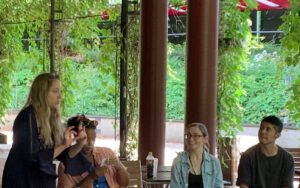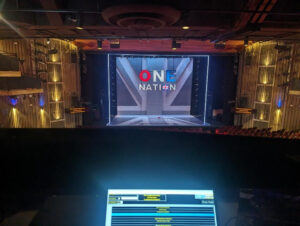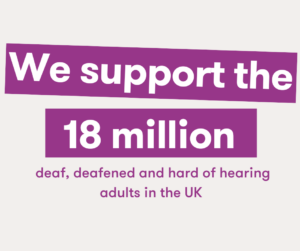We support the 18 million – how you can get involved
Who are the 18 Million?
As part of this year’s Captioning Awareness Week, Stagetext is inviting arts and cultural venues to support the 18 million adults in the UK who are deaf, deafened or hard of hearing.
Recently this year, RNID (Royal National Institute for Deaf people) published research showing that there are 18 million adults in the UK are deaf, deafened or hard of hearing. That means that one in three of us could benefit from subtitles and captions to experience the joy of live theatre, to sing along with our favourite musicals, to take guided tours around museums, or to see our favourite authors speak at festivals. You can read more about the research here.
We are committed to breaking down barriers and creating inclusive experiences for deaf, deafened, and hard of hearing people in arts and culture and we invite you to pledge your support.
Our own research has revealed that 77% of the UK population is in favour of venues offering more captioned performances to deaf, deafened and hard of hearing audiences and that if more captioning was offered by live venues, a third (31%) of the general public would be more likely to increase their attendance at live shows.
If you’re running a theatre, museum, or any cultural venue or event, this news is particularly relevant. Those 18 million people? They’re potential audience members. By making your events accessible, you’re future proofing and expanding your audience.
As well as deaf audiences, there are many other people who can benefit from captions. They are useful for anyone for whom English isn’t their first language, for instance, or for people who need support with concentration.
As part of Captioning Awareness Week, we are inviting venues and organisations new to providing quality text based deaf access, to commit to putting on their first captioned or live subtitled event to help support the 1 in 3 adults in the UK that are deaf. We are inviting you to support the 18 million with us.



How can you show your support?
-
Sign up to our FREE Deaf Awareness Training: If you’re an arts or culture professional, we invite you to our free Deaf Awareness Training Day in Gorleston Pavilion in Norfolk on 12 Nov. Book your place.
-
Book a Deaf Awareness Training: They’re friendly, interactive, and packed with practical tips and is uniquely aimed towards arts professionals. Book today.
- Don’t miss our upcoming webinar: Book your place on our webinar, Whose Line is It Anyway? We’ll explore how deaf viewers use subtitles to access videos, and what happens when subtitles aren’t quite right. We’ll also share best practices and answer all your questions about deaf accessible subtitles. Wednesday 20th Nov at 1pm.
- Best Practice Checklist: Our best practice checklist gives you a starting point on how to make sure your venue is accessible. The checklist will help you understand how to better embed access within your organisation. Download Checklist.
- Book us to caption or live subtitle your event: We can provide live subtitles for talks and festivals such as book festivals, or theatre captioning for scripted performances in venues of all sizes. We can even help you make your digital content accessible through subtitles. Contact us now to get started and we will support you every step of the way.
- Download our guidelines Want to know what makes theatre captions truly accessible? Download our Captioning Display Standards guide – it’s packed with practical tips and industry-leading guidelines. Captioning Display Standards.
- Take a look at our research Did you know that over 70% of the public wants more captioned performances? Discover how accessibility can expand your audience in our latest research.
- Take a look at our whitepaper on how to make extended reality (XR) – encompassing virtual reality, augmented reality and mixed reality – truly accessible for deaf, deafened and hard of hearing audiences. Read here.



